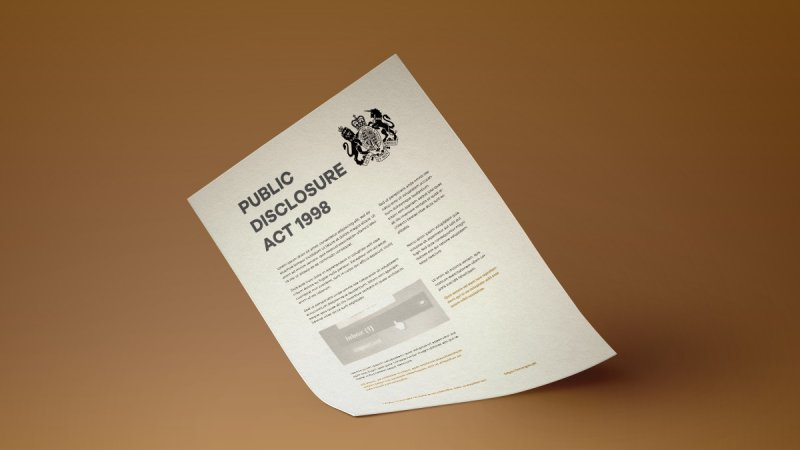The majority of whistleblowers receive protection under the Public Interest Disclosure Act 1998. The Act sought to eradicate victimisation of whistleblowers by their employers and prevent their inappropriate dismissal. Organisations are gradually developing whistleblowing cultures in which it is acceptable, possibly bordering on expected, that workers will report misconduct at work. This helps to protect the general public and reduce the incidence of fraud and misconduct at work. Protection is essential in order to empower workers to speak up.
What is Whistleblowing?
Whistleblowers are workers who report misconduct which has normally been seen at work. Whistleblowing must be for the greater good of the public and not regarding individual matters, which would instead be classed as personal grievance. Some examples of whistleblowing complaints are criminal offences, health and safety risks, environmental damage, miscarriage of justice, breaking the law and the belief that someone is covering up wrongdoing. You can choose who you report your concern to, from: your manager, other managers, the organisation’s legal and compliance team, human resources, a lawyer, an industry body (e.g. a trade union) or an external whistleblowing hotline. This is useful as if, for example, your manager was implicated in the misconduct, you could choose to talk to your human resources department about your worries instead.

The Need for Whistleblower Protection
Whilst many workers’ whistleblowing experience is smooth and productive, others suffer the repercussions of being labelled a whistleblower. Although many hail whistleblowers as brave and ethical, some people view them as snitches. This can generate a hostile atmosphere within teams and result in the victimisation of whistleblowers. Similarly, some suffer persecution at the hands of their employers and prior to the introduction of the Public Interest Disclosure Act 1998, workers risked being dismissed by their employer after blowing the whistle. Additionally, many people worry that their concerns will not be addressed when they blow the whistle.
From 1990 to 1995, around 35 children tragically lost their lives at the hands of Bristol Royal Infirmary’s cardiac surgeons, whilst dozens more suffered irreversible brain damage. The whistleblower, an anaesthetist present in many of these operations, suffered awful mistreatment after compiling information about mortality figures at the hospital. He approached management with the shocking figures but was repeatedly ignored. In fact, his efforts to generate attention nearly led to him being sacked by the trust’s CEO. Upon returning to work after the scandal emerged, he describes being “ostracised” by the medical profession and outlawed from the UK. He now practices as a doctor in Australia. Under the Public Interest Disclosure Act 1998, the anaesthetist would have had stronger rights in the aftermath of the scandal, which would have hopefully seen him remain as a practicing doctor within the UK. Despite the massive injustice in his treatment, this whistleblower revolutionised the way that mortality figures are collated and used within the NHS. Ripples triggered investigations in every corner of the NHS, which uncovered the Mid-Staffordshire NHS Trust scandal amongst many other areas for vital improvement.
Legal Protection
Whistleblowers are protected by the Public Interest Disclosure Act 1998. The Act prevents mistreatment by employers after blowing the whistle. This legal protection extends to you if you are an employee, a former employee, a trainee (e.g. a student nurse), an agency worker or a member of a Limited Liability Partnership (LLP). The Act means that if you suffer mistreatment from your employer as a result of whistleblowing, you have the right to bring the case before an employment tribunal.
Why is it Important to Blow the Whistle?
As well as the fact that protecting the public is an ethical thing to do, there are many additional benefits of whistleblowing. Firstly, the practice prevents cover-ups which could damage individuals or society. Similarly, it protects your organisation against fraud and misconduct. Considering the bigger picture, whistleblowing reduces the massive amount of taxpayers’ money which is spent on fraud every year. However, if the risks of whistleblowing appear too daunting, you could consider making your complaint anonymously. Whilst your complaint will still be addressed, the investigators will not be able to contact you for further information, so you may hinder investigative procedures. Maintaining anonymity also means that you will not be able to receive updates on the progress of your complaint. It is important to recognise that many whistleblowers who remain anonymous are still identified by teammates. But with the relevant protection in place, the fear of repercussions should not stand in the way of blowing the whistle. Whistleblowing training should be undertaken by all workers within an organisation, to protect your workers, your organisation, your customers and the general public.

